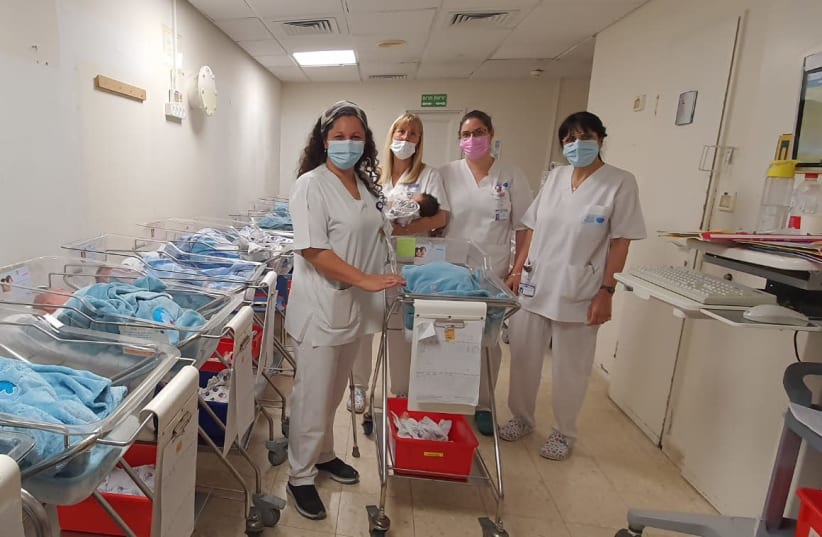The Barzilai Medical Center in Ashkelon relocated its nursery to its bomb shelter on Tuesday, as the country’s entire health system geared for further violence.
Some 21 babies were in the nursery as of Tuesday morning.
“We are working very hard,” said Dr. Jonathan Rieck, director of the Emergency Medicine Department at Barzilai, as he left the hospital at the end of a 24-hour shift. “We have been receiving casualties at various degrees, some serious and some very serious, as well as a lot of patients suffering from stress reactions and minor injuries as well. At the moment we are coping and we are continuing to do what we need to do.”
As of Tuesday afternoon, some 95 patients had been treated at Barzilai.
“The health system is preparing for the protraction of the hostilities against the terrorists from Gaza and will continue to fight for the health of the citizens of Israel,” said Health Minister Yuli Edelstein while visiting the injured at Barzilai. “It is also time to stress how absurd the idea of cutting back funding and positions within the health system is, for those who came up with such a bizarre plan.”
Israeli physicians went on a strike on Monday to protest the decision of the finance minister to not renew the budget for 600 doctors hired during the pandemic. The strike was interrupted in the afternoon as the security situation deteriorated.
On Monday night, ministry Director-General Chezy Levy instructed the hospitals to be on high alert, including maintaining additional staff for emergencies and the full availability of critical personnel.
Health officials and healthcare organizations met on Tuesday morning to discuss the situation and prepare for further escalation between the Israel Defense Forces and Hamas.
“The coronavirus has taught us all to coordinate in front of complex situations, and I am sure we will be able to do the same in the coming days as well,” Edelstein said. “We must provide solutions for healthcare workers in light of the cancellation of school. We will offer our contribution to national resilience in the best possible way.”
For more on Hamas attacks and IDF operations read hereFor more on rocket attacks against Israel read hereFor more on Israeli strikes on Gaza read here.For more on world reactions to Gaza violence read hereFor more on Israeli Politician Gaza reactions read here
Levy, National Emergency Authority head Yoram Lardo, IDF officials, representatives of the healthcare providers, and the hospitals were among those attending the meeting.
“Since the announcement of the high state of the alert, we have been working on providing solutions for the needs of our population, both to treat the injured from missiles and to ensure medical continuity for regular problems,” said Assuta Medical Center deputy director Dr. Hagit Sarbagil-Maman.
Preparations included discharging patients in order to lower the occupancy rate, but also setting up daycare for the staff’s young children, as kindergartens, pre-schools and schools were canceled in the whole southern Israel.
“We are familiar with this type of crisis, we know that in order to work people have to know that their children are safe,” said Sarbagil-Maman.
Because Assuta’s building was recently built, most of the structure is secure against rockets, allowing doctors to continue their work as the sirens send the rest of the population to shelters.
As of early Tuesday evening, 23 patients had been evacuated to the hospital, 13 for physical injuries and 10 for anxiety problems.
In light of the crisis, the ministry has set up resilience centers in several cities in the South, and healthcare providers Clalit, Maccabi and Leumit have set up hotlines for people who need support in case of emergency.
Rieck explained that most of Barzilai is also built in a secured manner.
“Moreover, many departments have been moved to the underground parts of the hospital,” he added.
In addition to the nursery, the neonatal intensive care unit and several internal medicine departments were relocated.
Rieck said that the situation is challenging for the personnel.
“A lot of our staff lives in Ashkelon,” he said. “They find themselves in the middle of the emergency room, dealing with injured people coming in as their families are at home in uncertainty. It is not easy.”
